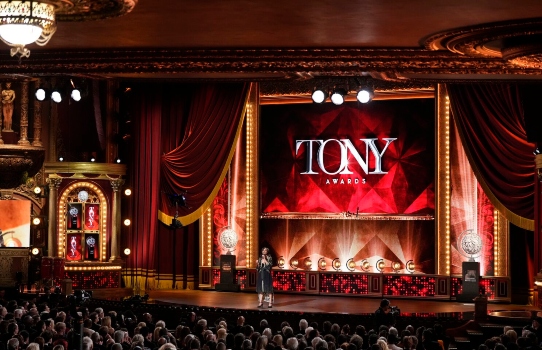
In honor of the Tony awards this past Sunday (which, incidentally, I thought were some of the best in years…the theatre itself looked great, and I was pleased with the time given to showcase all the shows, specifically plays), I thought I might go through my favorite Tony performances of all time. Keep in mind I am in no way saying these are “the best;” they are merely performances that spoke — and have spoken — to me over the years. And I think that’s important given what I see as the true function of the Tonys — and, based on the ways that certain prolific playwrights and other theatre luminaries fought to broadcast the Tonys despite the ongoing WGA strike (Tony Kushner, Martyna Majok, Jeremy O’Harris, David Henry Hwang, and Lynn Nottage were among others who championed the Tonys), it seems to be the consensus within the theatre community. Yes, the Tonys are a great way to celebrate the fabulous and hard work of theatre’s biggest stars and party down with our coworkers, but, especially at a time where theatre attendance rates are still dangerously low, in both the commercial and nonprofit sectors, the Tonys are most importantly an advertisement for Broadway, and the theatre at large. And more than an advertisement — a welcome to every person watching, no matter their ethnicity, creed, or sexual orientation, whether they’re from rural Ohio or the heart of New York City, that they too can be a part of this community, and that Broadway dreams can include them.
Obviously I was not alive in 1982 to see this show or performance in real time, but it’s one with which I had to start (this is also one of the better quality versions of this video I’ve ever found! Thanks “Rich Newton”!). The Dreamgirls movie — you know the one, with Beyoncé, Jennifer Hudson, Jamie Foxx, and Anika Noni Rose — came out when I was ten, and it left a huge impression on me. I saw the movie with my parents, in Salt Lake City of all places, and remember thinking that I had never seen anything like it. I was captivated by the tunes, by the story, by Beyoncé doing musical theatre, and, most importantly, by Jennifer Hudson’s performance. I just remember thinking that I had never seen a woman’s anguish, pride, fierce love, sense of self, and loyalty displayed so clearly via song. Later, when I went to Interlochen Arts Camp, I don’t think friend of the pod Evan Strouss will mind that I share how we spent whole evenings discussing “It’s Not Over” (the song which immediately precedes “And I Am Telling You” in the show, and in this video).
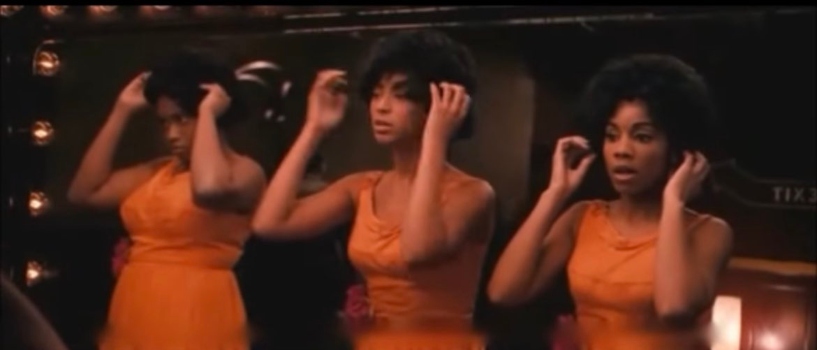
Finally, as an adult, I watched the Jennifer Holliday version via the Tony awards and was blown away a second time. Holiday brings a vulnerability to the role, and to this performance, that I hadn’t seen before: watch her face as Curtis sings “she had nothing to do with this change; it was you; it was you always thinking of you” at 2:35. Watch as it transforms seamlessly into anger and incredulity at 3:02. And that VOICE. I think it’s fair to say that this show changed the game on Broadway — specifically for the African American community and anyone who didn’t have a classic “Broadway body,” as I explored in my podcast episode with Ryan Donovan — but imagine how the Tony performance in particular changed things. I also think it’s a perfect example of what a good Tony number should do: represent the heart and soul of the show. Tell us what seeing the performance in its entirety will feel like. And if watching the original, Michael Bennett version of Dreamgirls felt anything like watching this video — that’s an experience for which I’d buy a ticket.
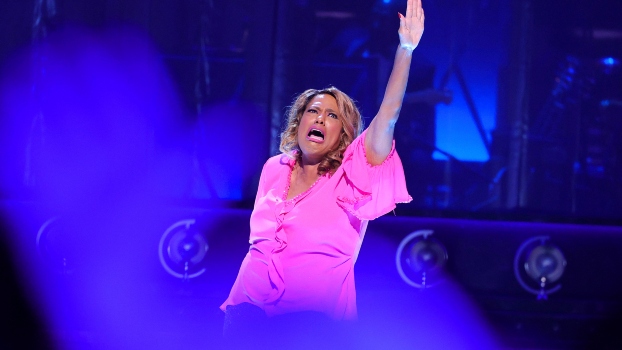
This performance I remember watching in real time. I would later see Spring Awakening…in fact, this Tony performance convinced me to beg my mother for tickets (once again, the medley was doing its job)…but at the time I knew next to nothing about the show. As an impressionable, theatre-obsessed 12-year-old, for whom teenagedom and sexuality was just starting to open up, they had me at hello. Whatever your opinions of Lea Michele, she captures the viewer from the get — with that crystalline voice, but also with that yearning, that questioning, and that dangerous curiosity, that really only a teenager can understand.
More importantly, as the music switched seamlessly from folk-inspired to rock, I was shook. I had grown up on the musical theatre of my parents and grandparents: Guys and Dolls, The Sound of Music, the occasional modern musical trying to sound like an old one (The Producers or The Drowsy Chaperone come to mind), maybe a Sondheim thrown in there (my grandma was playing me the Company OBC at the tender age of nine). I didn’t know that musical theatre could feel dangerous, sexy, and, perhaps most importantly, cool.
Finally, the way that they got around the censors, and were still able to perform one of their most famous and transgressive songs (“Totally F*%cked”), I still believe today is one of the most genius directing/dramaturgical choices ever made at the Tonys. You’ll see at 3:02, as the song begins, the actors cover their mouths every time a curse word would usually fit in the lyrics. I imagine the creative team and producers agonized over this choice…how could they perform at the Tonys without doing this iconic song, that so represents the (“smells like teen”) spirit of the show; but how could they possibly do it on live, network TV? I’m sure that the hand covering at first felt like a silly solution to them, but, to the 12-year-old watching, it completely titillated. It had the effect of making every tween and teen watching think: I know what word goes in there, and I feel special for knowing, AND I also feel this way 90% of the time. Isn’t everything “totally f*%cked”???
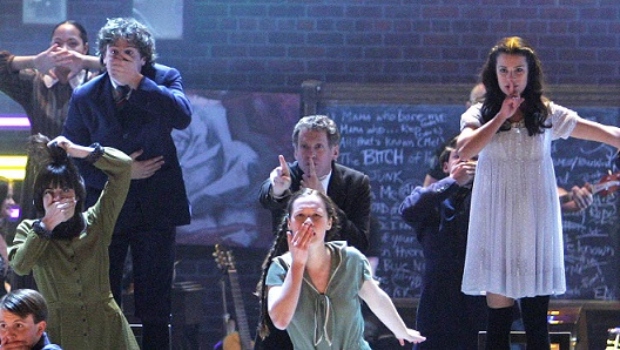
Now, watching as an “adult,” I think the silly nature of the choice brings a certain tongue-in-cheek humor to the song, and the performance, completely unique to the Tonys and appropriate for the show, as if to say, “isn’t it ridiculous that we have to censor this word on live TV? And, perhaps, isn’t teenage angst even more ridiculous?” Go watch this performance now if you know what’s good for you.
Despite the fact that I loved how the scriptless Tonys this year made some room for the plays to be better showcased, if anyone ever questions the value of the WGA, even for an awards show like the Tonys, you need only show them this clip. I know this isn’t technically a Tony nominated performance, but it absolutely should be, and it’s one of the few of these that I actually watch on a regular basis. To me, it represents everything I love about musical theatre: tongue-in-cheek, self-aware humor (when else does a lyric reveal at 0:45 get THIS big a laugh?!) and a big, brash, Stroman-esque number, with multiple costume changes (see 4:57…after the unforgettable, and, at the time, “controversial” lyric “come in and be inspired there’s no sodomy required”). The lyrics are just so damn smart: see 1:45…”it’s not just for gays, the gays and the Jews, and cousins in from out of town you have to amuse, and the sad embittered malcontents who write the reviews”).
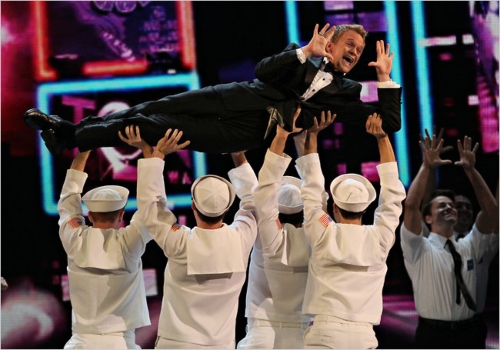
I even love the chaos of Brooke Shields’ performance at 3:13 (hey…it’s live theatre…anything can go wrong at anytime). When I was writing this, and thinking about what makes the performance so great, I also came to the fact that it’s an example of the Broadway community not taking itself too seriously. So often working in theatre, and especially when I watch the Tonys, I feel like we get bogged down in a sort of pseudo-seriousness about what we do and our “calling.” And of course what we do is important — I have a whole podcast/blog about it — but at the end of the day, we are not curing cancer, and, like any industry, ours is flawed. Sometimes, you just have to laugh, like when I was working on a show in 2018 and kept hearing people yell that they needed “more fake lobster puppets” onstage or the “fake legs don’t look funny enough!” (yes, these are real conversations I’ve had on creative teams). This Tony opener was a rare moment where it felt like Broadway was returning to its roots of play and fun, and able to laugh at itself a little. Ironically, this made the celebration feel all the more authentic and fun.
Ok, not to be dramatic, but I think this is the greatest Tony performance of all time. Hear me out: I watched these Tonys on my first full night in company housing at a regional theatre. I was twenty years old; it was my first real “professional” production; and I was terrified. The fact that I was living with eight strangers in a shared house didn’t help. I remember crowding around the TV to watch, unsure about whether we’d all have the same opinions about shows, or think the same jokes were funny, and just being awestruck by this performance. It’s one of the rare Tony performances that highlights the work of a single actor, rather than a medley of performances or a big number from the entire company (the other being Book of Mormon). There’s a reason shows tend to do big group numbers for the Tonys, and it was ballsy of Fun Home (and other shows like Mormon that have done the same). It places all of your trust in that single actor, hoping that his/her/their performance will do all of the things a Tony performance is supposed to do: as discussed above, to represent, and advertise, the show, to represent, and advertise, theatre at large, and to welcome soon to be theatre geeks into the world and the community. That’s a lot to ask of a single song and a single performer — especially a child, as was the case with Fun Home, and Sydney Lucas’ legendary performance. But as soon as Sydney sees the object of her fascination (and desire) at 0:48, and the music begins, I wasn’t concerned.
She grabs our attention from those first notes: a pillar of truth so focused on the unseen woman that we, the audience, almost see her too. She doesn’t need to move, she doesn’t need to gesticulate, everything you need to know about the character (Alison), and the emotions and thoughts running through her, is displayed on her face. The best word I can use to describe this performance is focused: it’s the kind of performance (see 1:33 when she first takes a step forward to the audience) that people spend semesters studying in “acting the song classes” (for the other best example of this, see Sutton Foster’s performance of Gimme Gimme on the Rosie O’Donnell show in 2002). I think Sydney moved maybe three feet throughout the entire song, but through her razor sharp focus we, the audience, understand the incredible degree to which the character has changed. Similarly, special note should be given to the masterful camera-work, particularly at 1:57, which placed the audience BEHIND Sydney in an amazing reversal of perspective that effectively opened up the world and mimicked the way Alison felt freed by the object of her desire.
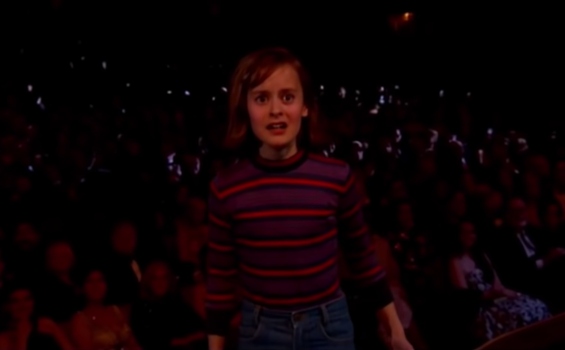
It’s also a masterclass in acting the song in the sense that Sydney was able to capture the process of word choice, which so often confounds actors, especially when singing evocative or complex lyrics. A good example on the other end of the spectrum is Sutton Foster and Joel Grey “finding the words” in “Friendship” in the 2011 Anything Goes revival. There, the process of finding the words is used to comedic effect; here, the process (“I feel–” “I feel–“) is exasperated and confused, until the ultimate moment of clarity and freedom (“who sees you’re beautiful…no, I mean, HANDSOME”). By the time Sydney sings “I know you” at 3:47, we know her (the character), we know the show, and we know — or at least sense — the incredible power of the theatre…to transport, to articulate, and to make you feel. And given the effect this video had on me, imagine the effect it had on anybody in the LGBTQ community. The comments on the YouTube video reflect this fact, even today, and, looking at the hundreds of people who have written into the online forum about how the performance reminded them of their childhood, or of coming out, or made them want to come out, I myself am reminded of what a Tony performance can do.
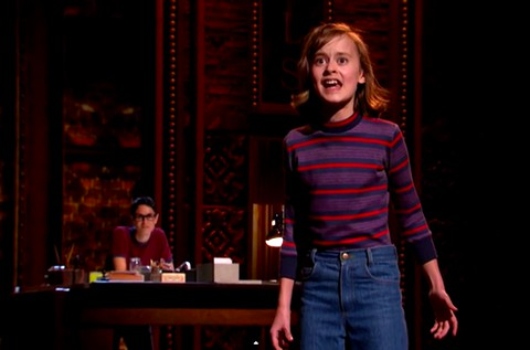
I hope you go back and watch all of these incredible performances and consider how the Tonys is intended to advertise (or not advertise) the Broadway and theatre community at large. In today’s economic and artistic climate, should we be thinking outside the box and doing more performances/award shows/celebrations like this? What do you think are the most effective Tony performances — big, ensemble numbers, solos, or medleys? What performances do you remember? Sound off in the comments, and be sure to stay tuned next week for a new podcast episode and article.


Spectacular! Your writing continues to amaze and impress me! Your understanding of Fun Home was so fantastic—-I loved it, and while I’m sure I didn’t understand the staging, and how that contributed to my understanding, the scene was magical and set up the rest of the play! All of your observations are incredibly on point and show an openness and willingness to submit to whatever show you are viewing! I hope all this makes sense—-I just can’t say enough!